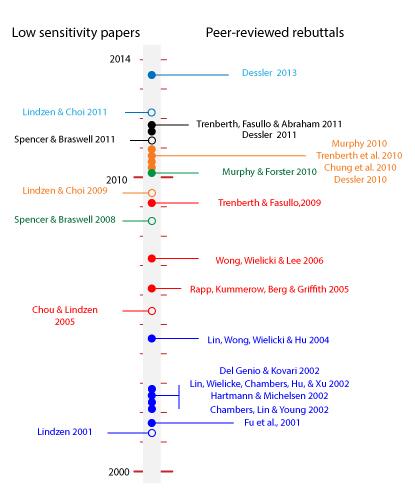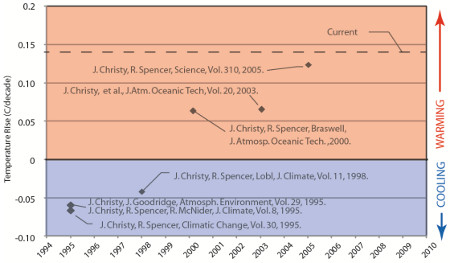Climate imbalance – disparity in the quality of research by contrarian and mainstream climate scientists
Posted on 11 April 2014 by dana1981
A new paper has been published in the journal Cosmopolis entitled Review of the consensus and asymmetric quality of research on human-induced climate change. The paper was authored by John Abraham, myself, John Cook, John Fasullo, Peter Jacobs, and Scott Mandia. Each of the authors has experience in publishing peer-reviewed responses to flawed contrarian papers.
Despite the 97% expert consensus on human-caused global warming supported by peer-reviewed research, expert opinion, the IPCC reports, and National Academies of Science and other scientific organizations from around the world, a large segment of the population remains unconvinced on the issue. A new commentary by Edward Maibach, Teresa Myers and Anthony Leiserowitz in Earth's Future notes that most people don't know there is a scientific consensus about human-caused climate change, which undermines public engagement on the subject.
This 'consensus gap' is in large part due the media giving disproportionate coverage to climate contrarians. In our paper, we sought to evaluate whether that disproportionate media coverage was justified by examining how well contrarian hypotheses have withstood scientific scrutiny and the test of time. The short answer is, not well.
 Low climate sensitivity papers by Lindzen and Spencer (open circles) and peer-reviewed rebuttals (closed circles). Created by John Garrett of Wildomar, CA.
Low climate sensitivity papers by Lindzen and Spencer (open circles) and peer-reviewed rebuttals (closed circles). Created by John Garrett of Wildomar, CA.
The first contrarian argument examined in our paper was the claim that the Earth is not warming. This argument was particularly popular in the late 1990s and early 2000s, when John Christy and Roy Spencer from the University of Alabama at Huntsville published an analysis of satellite data that seemed to indicate the lower atmosphere was cooling. This appeared to contradict surface temperature measurements from thousands of thermometers around the world, which when combined together, indicated substantial global warming. Contrarians were certain that the thermometers were wrong, the satellites were right, and we didn't have to worry about global warming.
However, it turns out that satellite measurements of atmospheric temperatures are very tricky. The satellites are positioned above the atmosphere that they're trying to measure, and have to peer through many different atmospheric layers. Their orbits also drift, and satellites have limited lifespans, forcing scientists to splice together measurements from different instruments.
Gradually, various problems with the satellite temperature measurements were identified, some by the Huntsville group, and several by other groups. Corrections were made to the record, and before long the satellite record showed the warming of the lower atmosphere happening at a similar rate to that estimated from the thermometers around the globe.
 Evolution of lower tropospheric temperature trends from satellite observations.
Evolution of lower tropospheric temperature trends from satellite observations.
Two decades later, additional possible biases are still being identified in the satellite temperature record. Nevertheless, contrarians continue that the lower atmosphere isn't warming as fast as it should be, or that the surface thermometer measurements are biased hot (recent research has shown they actually have a cool bias). However, Christy and Spencer's claim that the planet isn't warming did not withstand scientific scrutiny or the test of time.
The second contrarian argument we investigated involved the claim that the global climate is not very sensitive to the increased greenhouse effect because the planet has some sort of natural climate response that will offset global warming. One of the first such arguments in the peer-reviewed literature was the 'infrared iris' hypothesis from contrarian darling Richard Lindzen.
The premise of Lindzen's hypothesis was that as the climate warms, the area in the atmosphere covered by high cirrus clouds will contract to allow more heat to escape into outer space, similar to the iris in a human eye contracting to allow less light to pass through the pupil in a brightly lit environment. However, within a year of Lindzen's iris hypothesis paper being published, four scientific groups had published their own studies finding significant flaws in his methods and assumptions, shown in dark blue in the first graphic above.
Several more critiques were published in the ensuing years failing to find evidence supporting the iris concept (red in the first graphic), showing that while the scientific community took this new hypothesis seriously, it simply failed to withstand scientific scrutiny. Although this is the case for most of Lindzen's arguments, he continues to be among the most highly sought contrarians by journalists and policymakers who try to create the perception of significant disagreement amongst climate science experts.
Roy Spencer and his colleague Danny Braswell have similarly published papers arguing that the climate is not as sensitive to the increased greenhouse effect as most climate scientists believe and most of the available evidence indicates. A paper they published in 2008 used a very simple climate model to make this argument, but subsequent research showed that their model was actually too simple, and failed to accurately represent how the global climate operates (green in the first graphic).
Spencer and Lindzen published several other papers making similar arguments in subsequent years, but these again failed to withstand scientific scrutiny (orange, black, and light blue in the first graphic). Various other scientific groups pointed out several flaws in the methods and assumptions in each of their publications, and in fact one editor resigned because he felt his journal had failed its task of conducting rigorous peer-review in publishing a fundamentally flawed 2011 Spencer and Braswell paper (black in the first graphic).
To contrast, human-caused global warming is based on solid fundamental physics that we've understood for over a century. In contrast to the relatively few studies mentioned here, thousands of studies have scrutinized and reaffirmed the basic physics that underlies the theory. It has withstood the test of time.































 Arguments
Arguments






























quote: "Despite the 97% expert consensus on human-caused global warming supported by peer-reviewed research, expert opinion, the IPCC reports, and National Academies of Science and other scientific organizations from around the world, a large segment of the population remains unconvinced on the issue."
I guess a large segment of the population (ie.the majority) aren't even aware of the evidence regarding AGW one way or the other. I think we kid ourselves that far more people share our concerns or interest in climate change than actually do. Not only do we need to silence the damage done by deniers we need to convince many that they need to start considering the issue in the first place.
As wrong as this may sound, I don't think we can ever expect people to do anything. If governments won't do it, it won't get done. The only way I could see this working is if there became a contract between nations that sign up to reduce carbon which only allows them to do 80% of all business between each other.
It is clear that some people will not “change their thought processes and motivations” just because the better understanding of all the available information contradicts what they prefer to believe (or in this case what they want others to believe). Only when these people among the “contrarians to climate science” are acknowledged as being irrational is there hope that they would begin to more rationally pursue the best understanding of the issue, even when that better understanding will result in them rationally understanding the loss of personal opportunity for maximum benefit from unsustainable and harmful activities that is required by that better understanding.
It may be helpful to use a different term to refer to people whose actions indicate a high degree of certainty that they are not genuinely interested in developing a continuously improved best understanding of what is going on, motivated by a resistance to the changes of human activity that is required by that improved understanding.
Maybe “deliberate irrational objectors” should be the term for people who strive to create doubts regarding the best understanding of the results of the climate science even though their familiarity with “all of the available information” should not lead them to try to make the claims they try to get away with. These are people who deliberately object to the understanding that would result from a reasoned and rational evaluation of all the available information. And their motivation for being “deliberate irrational objectors” is clear. The current developed socioeconomic system created a lot of people who desire the personal benefits they can obtain from deliberately pursuing benefit from unsustainable and harmful actions. That is a very powerful motivation. And the deliberate irrational objections it can lead to must be recognized and called what they most likely are.
Having said that, the term deliberate irrational objector can be manipulated to lead thoughts away from the intended description of the person, to make it seem disparaging or unfair. It almost becomes necessary to describe the term every time it is used to make it more difficult for the deliberate irrational objectors to deliberately irrationally object to it, but they still will try.
I'd be interested to know what percentage of the contrarian papers have since been found to be incorrect? Are there any that have not?
I guess one could ask the same of those papers affirming the climate science, although that might not be so simple a task given there are so many.
This point may be have been addressed in the paper itself, which I am unable to read as it requires a subscrition at the moment.
It's worth adding the recent "Stadium Wave" hypothesis by Judith Curry to this list, as it just has received a solid debunking by Mike Mann. For details, go to the article I just referenced in the weekly roundup thread.
In 1982, the relatively new concept of CO2 induced climate change was intuitively forecasted. One prediction was a large volcanic eruption in early 1990s that would help scientists calibrate models. Pinatubo happened and Jim Hansen calibrated his models and became a motivated desciple of climate action.
The conclusion of the forecast was that civilization would either put a tax on carbon or fail in controlling climate change. The other pertinent forecast was that the arc of interest in the subject would mature in the decade of 2000 to 2010. Civilization has not really activated a tax on carbon.
Now as public interest in the subject wanes, according to the old frecast, will we successfully tax carbon? Has civilization failed to act on time to avert feedback loops that will through us into chaos?
PluviAL
In 1982 the concept of CO2 Induced climate change wasn't that new.Arrhenius had suggested it in 1895. Callender thought about it in the 30's,. Gilbert Plass and others such as Bert Bolin were exploring it in the 1950's, Manabe & Wetherald put it on a solid footing in 1967. The President's Scientific Advisory Committee warned of the possible risk in 1965.